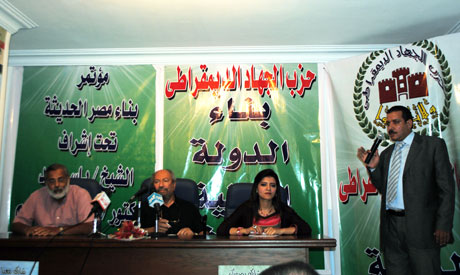 Egypt’s Al-Jihad group on Tuesday announced plans to launch a political arm, ‘the Democratic Jihad Party,’ to back presidential finalist Ahmed Shafiq against Muslim Brotherhood candidate Mohamed Mursi in this week’s hotly-contested runoff vote.
Egypt’s Al-Jihad group on Tuesday announced plans to launch a political arm, ‘the Democratic Jihad Party,’ to back presidential finalist Ahmed Shafiq against Muslim Brotherhood candidate Mohamed Mursi in this week’s hotly-contested runoff vote.
The group made the announcement at a conference in Cairo organised by prominent Egyptian human rights activist Saad Eddin Ibrahim.
“Following the Arab uprisings, Al-Jihad wants to carve out a place for itself in the democratic political arena,” said Ibrahim, who spent years in prison with high-ranking members of the group during the Mubarak era.
Al-Jihad’s open support for Shafiq – Mubarak’s last prime minister – was received with surprise by many in the audience, given the group’s violent past and radical ideology.
“Shafiq is the best candidate; he will promote a civil state,” Sheikh Yasser Saad, the group’s ostensible leader, told Ahram Online. “Mursi, for his part, would establish a theocratic state ruled according to the Muslim Brotherhood’s bureaucratic structure with the final word in the hands of the group’s supreme guide.”
“Mursi and the Brotherhood have two faces: one abroad and another in Egypt,” Saad added. “Shafiq, on the other hand, is not acting or using religion to garner support. Shafiq’s affiliation with the old regime is admittedly an advantage, but he’s nevertheless the only choice for Egypt.”
Al-Jihad media chief Sabra Ibrahim elaborated on the group’s longstanding distrust of the Muslim Brotherhood.
“The Brotherhood doesn’t have the Egyptian people’s best interests at heart,” Ibrahim asserted. “They’re preoccupied with their own political ambitions.”
Al-Jihad’s position on contentious issues, including those related to female dress codes, also appear to have been significantly diluted, as exhibited by young, unveiled party member Hanan Nouredin.
“Democratic Jihad is a moderate party,” she stated. “It doesn’t belong to the left or the right.”
When asked directly about the group’s position on the hijab, Saad responded: “The question isn’t whether [wearing the hijab] is obligatory, but whether not wearing it represents a big or small sin.”
Whether the hijab will be deemed a legal requirement by the new party, however, remains to be seen.
On issues relating to minority rights, meanwhile, Saad stressed that the new party would take an “all-embracing approach” towards all citizens of Egypt, regardless of religious denomination.
Al-Jihad’s new pacifist approach represents a break from its violent past, which led to its international prohibition by the United Nations and various governments based on its alleged affiliation with the shadowy ‘Al-Qaeda’ organisation. The faction’s principal goal had been to overthrow and replace the Egyptian regime with a theocratic state, while US and Israeli interests had been considered legitimate targets by the group.
Al-Jihad was founded in 1980 through the merger of two previously-existing Islamists groups: a Cairo branch headed by Mohammed Abdel Salam Faraj; and an Upper Egyptian branch led by Karam Zuhdi. Following the imprisonment of numerous members due to their alleged involvement in the 1981 assassination of president Anwar Sadat, the group broke into two fronts, with those from Cairo remaining part of Al-Jihad while their Upper Egyptian counterparts formed Al-Gamaa Al-Islamiya.
The small and disciplined Al-Jihad faction was led by Aboud El-Zomor, who was eventually replaced by ‘Al-Qaeda’ leader Ayman El-Zawahiri following El-Zomor’s imprisonment for his alleged role in the assassination. Once released from prison, many group members fled to Pakistan and Afghanistan to assist the mujahideen freedom fighters there in fighting the soviet military.
“While in prison, we read and learned a lot about religion, which helped transform our ideology,” Saad recalled, “hence our current, non-violent worldview.”



